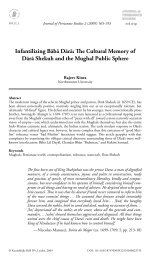The Mughals, the Sufi Shaikhs and the Formation of the Akbari ...
The Mughals, the Sufi Shaikhs and the Formation of the Akbari ...
The Mughals, the Sufi Shaikhs and the Formation of the Akbari ...
You also want an ePaper? Increase the reach of your titles
YUMPU automatically turns print PDFs into web optimized ePapers that Google loves.
FORMATION OF THE AKBARI DISPENSATION 141<br />
opponents, including <strong>the</strong> dreamer Dattu, must have been observing<br />
with interest. 9 However, <strong>the</strong> fact that <strong>the</strong>y were incorporated into<br />
Gangohi’s tazkira <strong>and</strong> continued to be an integral part <strong>of</strong> it, shows<br />
<strong>the</strong> image <strong>of</strong> <strong>the</strong> Shaikh that Gangohi’s descendants <strong>and</strong> disciples<br />
preferred to keep, even when, as we will see later, <strong>the</strong>y vied with <strong>the</strong>ir<br />
rivals, <strong>the</strong> Naqshb<strong>and</strong>is, to have some influence in Mughal <strong>of</strong>ficial<br />
circles.<br />
Gangohi, however, also seems to have periodically tried to develop<br />
good relations with Mughal conquerors. We possess letters written<br />
by him to Babur, Humayun <strong>and</strong> also to a Mughal noble, Tardi<br />
Beg. Besides <strong>the</strong> routine contents that such letters transmit, namely<br />
exhortations for pious acts <strong>and</strong> generous care for <strong>the</strong> learned <strong>and</strong> <strong>the</strong><br />
saintly, in his letter to Babur, Gangohi particularly projects himself<br />
as an orthodox Sunni advocate <strong>of</strong> a ra<strong>the</strong>r narrow <strong>and</strong> bigoted juristic<br />
version <strong>of</strong> <strong>the</strong> shari’a. 10 To some extent he contradicts here, an earlier<br />
position elaborated in his Rushd Nama. 11 Not much however can really<br />
be made <strong>of</strong> his apparently changed position, especially if we take into<br />
context <strong>the</strong> fluid <strong>and</strong> ambiguous political conditions in which <strong>the</strong>se<br />
letters were written. Features <strong>of</strong> indigenous devotional religion in fact<br />
continued to be part <strong>of</strong> his tasawwuf. He also never gave up teaching<br />
<strong>the</strong> Rushd Nama to his disciples. 12<br />
As someone recovering from <strong>the</strong> trauma <strong>and</strong> humiliation <strong>of</strong> Mughal<br />
captivity, Gangohi’s uncompromisingly bigoted position in his letter<br />
to Babur could also have been intended to reinstate himself as a<br />
pious pir, with an unstated assertion that his close affinity with <strong>the</strong><br />
erstwhile rulers had been for a purely religious objective, unconcerned<br />
with anything pr<strong>of</strong>ane <strong>and</strong> this-worldly. Whe<strong>the</strong>r he succeeded in his<br />
effort or not is a moot point. <strong>The</strong>re is not much evidence in <strong>the</strong><br />
existing contemporary sources—ei<strong>the</strong>r from courtly circles or <strong>Sufi</strong><br />
fraternities—to show his, <strong>and</strong> for that matter <strong>of</strong> any o<strong>the</strong>r Chishti<br />
shaikh’s, regular <strong>and</strong> sustained connections with <strong>the</strong> early <strong>Mughals</strong>.<br />
<strong>The</strong> position <strong>of</strong> pir to Babur <strong>and</strong> Humayun was still a preserve <strong>of</strong><br />
9 Compare Digby, ‘Dreams <strong>and</strong> Reminiscences’, p. 80n.<br />
10 Maktubat-i Quddusiya, pp. 224–25 <strong>and</strong> 335–39.<br />
11 Simon Digby, ‘Abd al-Quddus Gangohi (1456–1537 A.D.): <strong>The</strong> personality <strong>and</strong><br />
attitudes <strong>of</strong> a Medieval Indian <strong>Sufi</strong>’ in Medieval India—A Miscellany,Vol.3, pp. 1–66,in<br />
particular pp. 34–66; S.A.A. Rizvi, A History <strong>of</strong> <strong>Sufi</strong>sm in India, Vol. I (Delhi: Munshiram<br />
Manoharlal, 2003 reprint), pp. 339–49.<br />
12 Digby, ‘Abd al-Quddus Gangohi’; see also Iqtidar Alam Khan, ‘Shaikh Abdul<br />
Quddus Gangohi’s relations with political authorities: A reapparaisal’ in Medieval<br />
India: A Miscellany, Vol.4, pp.73–90.<br />
http://journals.cambridge.org Downloaded: 15 Feb 2011 IP address: 129.174.97.34






